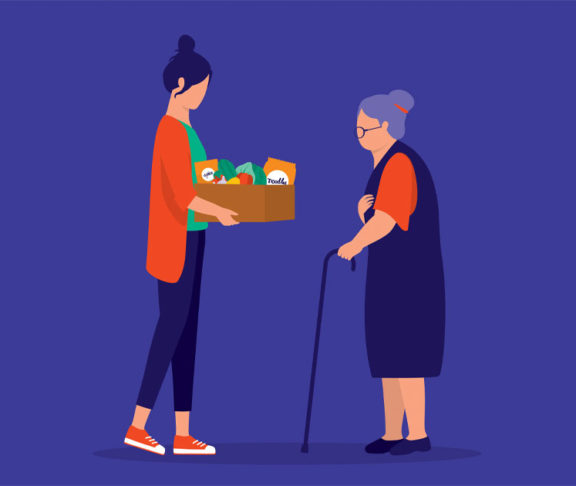For many homebound seniors, a few minutes of companionship is just as meaningful as the food they receive.
A hard blow during a martial arts routine left Bruce paralyzed on the right side of his body. Most of his time is now spent at home, where he often struggles to get through the day. Meals on Wheels rescued him, in more ways than one.
“I’d be sitting there and waiting for that knock on the door. It isn’t just the food, you know? It’s the company.”
Charlene has lived in her Maryland home since 1966. Regular check-ins from Meals on Wheels allow her to age independently.
“I always say, as long as I understand things and it’s something that I could do for myself, I will be here.”
Meals on Wheels, a concept that originated in Britain during World War II, has provided nutritious dinners, friendly conversation, and a watchful eye on the health and safety of seniors in the United States for decades.
“Meals on Wheels is a trusted, time-tested, relevant, client-centered, community-informed, national network of community-based aging and nutrition services providers grounded in a rich past, well positioned and excited to evolve to meet the changing needs of the older adults we serve,” explains Jenny Young, vice president of communications. “Meals on Wheels partners and engages with caregivers around the country to support their loved one’s ability and desire to age in their community of choice and live a nourished life with dignity and respect.”
Social isolation
Of the more than 77 million Americans 60 years old and older, 1 in 4 lives alone. Many report feeling lonely, making them vulnerable to health issues that could threaten their ability to stay out of institutional settings.
“Many of the factors that make older adults more susceptible to social isolation and loneliness — like living alone; having past experience with falls; retirement/loss of colleague network; and loss of friends, spouses, or other family members — are common among individuals receiving Meals on Wheels,” says Young. “For many homebound recipients, the person delivering their meal may be the only person they see that day or even that week.”
Local offerings include Friendly Visitor programs, telephone visits, reassurance calls, and creative aging programs. Support may also include access to pet food and veterinary services.
Changing nutritional needs
Seniors generally require fewer calories, yet they have higher specific nutrient needs, including vitamins C and B12, calcium, dietary fiber, and potassium. Older Americans also have different expectations regarding the kinds of food they eat.
“Meals on Wheels programs continue to offer person-centered nutrition and meal services, finding creative and inventive ways to meet cultural, medical, and personal food preferences,” says Young. “Some Meals on Wheels programs are partnering with ethnic restaurants to provide access to regionally or culturally appropriate meals. Other programs are partnering with healthcare entities and health plans to ensure medically tailored meals are provided to support client health and wellness.”
Dealing with COVID
Undeterred by the pandemic, Meals on Wheels mobilized to help the surging number of seniors in need, and they adapted their model practically overnight.
“Congregate meal sites converted from offering indoor dining opportunities to socially distanced ‘grab and go’ services, or they transitioned previously mobile seniors to home-delivered meal service,” Young explains. “Instead of high-touch, daily meal deliveries that could put seniors at risk, volunteers dropped off food boxes or a full week of prepared meals on the doorstep, and frequent phone calls replaced face-to-face interaction to maintain a much-needed level of social connection.”
More than half of local Meals on Wheels programs plan to maintain COVID-related changes to their programming moving forward.
Making a difference
Young calls volunteers the lifeblood of the Meals on Wheels program, which typically serves seniors with social, economic, and/or transportation needs. Each visit eases the burdens these adults experience.
“It brings hope,” says Young. “It brings health. It brings the nutrition and care that will completely make their day. “

